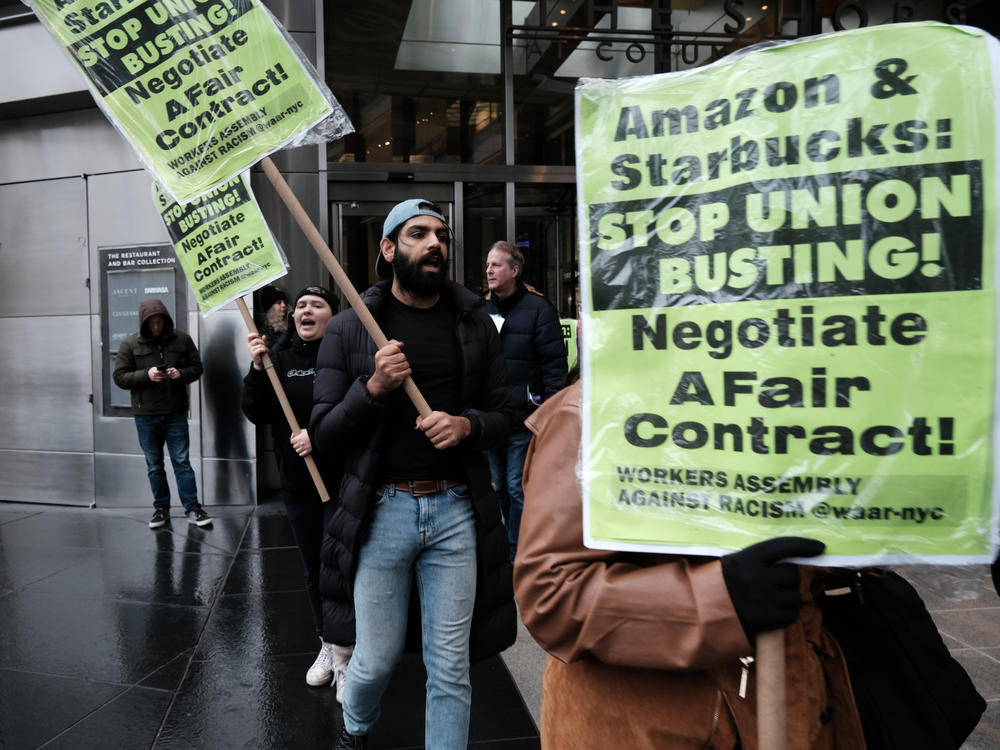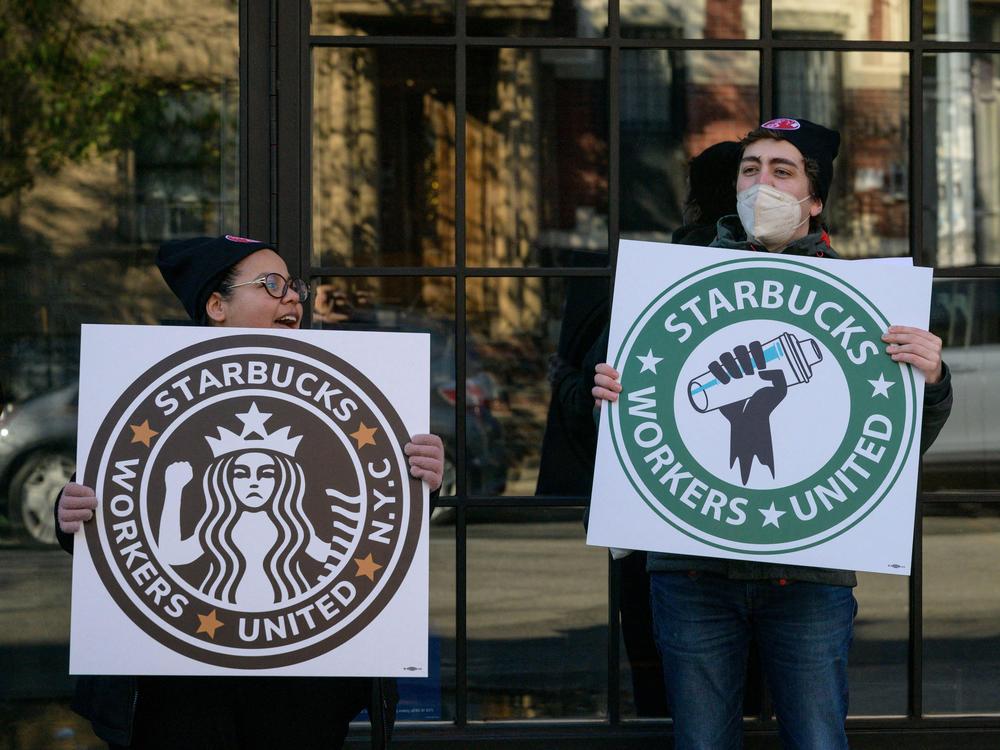Loading...
Section Branding
Header Content
Unions are having a moment. So why isn't union membership booming?
Primary Content
It was the Champagne pop heard around the economy. One year ago this week, a fired Amazon warehouse worker turned labor activist sprayed Champagne and then drank from the bottle outside federal labor offices in New York City.
Swarmed by supporters and media, Chris Smalls toasted a victory: the first Amazon union in the U.S., led by Smalls and other workers at an 8,300-person warehouse on Staten Island, a feat few believed they could pull off.
Since then, though, the Amazon Labor Union has gained little ground. It has yet to win another union election. And Amazon still refuses to sit down for contract negotiations.
In fact, despite the buzz around what seemed like a labor resurgence — the historic win at Amazon, as well as spirited campaigns at Starbucks, on college campuses and retail stores across the country — the overall picture for unions remains bleak.
This week, we may get a window into why. On Wednesday, fresh from his third stint as Starbucks CEO, Howard Schultz will head to Capitol Hill, where he'll face questions about everything Starbucks is doing to discourage its workers from joining unions.
Only about 1 in 10 U.S. workers is a union member
Just 10% of American workers belonged to a union in 2022, the lowest in Labor Department records going back to 1983, when the rate was 20%.
Never mind that 71% of Americans approve of unions, the highest in nearly six decades and up from 48% in 2009, a Gallup poll conducted last summer found.
The bottom line is that labor law itself is tilted in favor of employers, say researchers who study labor movements, often making corporate hostility toward unions too hard to overcome. The recent groundswell of public support is far from enough to spark a union comeback.
"Those of us who have been watching this stuff for many decades have actually been pleasantly surprised by the success that has occurred, but it's too modest in scope and too fiercely resisted by employers" to move the needle, says Ruth Milkman, a labor sociologist at the Graduate Center at the City University of New York.
Since December 2021, nearly 300 Starbucks stores — less than 3% of its company-owned locations in the U.S. — have unionized, and not without a fierce fight.
Unfair labor practice charges against Starbucks are piling up at the National Labor Relations Board. The agency's regional offices have issued scores of formal complaints, and its administrative law judges have so far found that Starbucks violated labor law in eight separate cases across the country.
Starbucks denies engaging in unlawful activity. The enforcement actions taken by the National Labor Relations Board do not appear to be forcing a change of heart.
In fact, the law allows companies to engage in anti-union activities, including finding ways to slow down every stage of the organizing process, Milkman says.
One big weapon against unionization: delay, delay, delay
Starbucks, for example, insisted early on that individual stores, which often employ just 25 to 30 people, should not be allowed to hold union elections, but rather, all stores in a geographic region must vote together in one election, increasing the degree of difficulty for union organizers. Federal labor officials ruled against Starbucks, and elections proceeded at the store level, but not without significant delays.
Labor law also allows for a lengthy appeals process, which Amazon is using to great effect to delay collective bargaining at the Staten Island warehouse.
Following a marathon Zoom hearing last summer, federal labor officials found Amazon's objections to the Staten Island union election to be meritless and in January ordered the company to begin negotiations with the union.
But Amazon has since formally requested a review of that decision. If that review doesn't go in its favor, Amazon can still take its case to federal circuit court for another round.
Toothless penalties for violating labor law and a fix that's going nowhere
Unions have fought back, filing hundreds of unfair labor practice charges over anti-union activities, citing things like companies closing stores, cutting hours, and threatening and firing organizers at stores that had or were trying to unionize. (Companies have also filed unfair labor practice charges against unions, but far fewer.)
But even where the NLRB has found violations of workers' rights to organize, the board's decisions don't have much financial bite. The agency's administrative law judges can only impose what are called "make whole" remedies, things like back pay, reinstatement and reimbursement for financial harms suffered as a result of unlawful activities.
"It's a cost of doing business," AFL-CIO President Liz Shuler said in Senate testimony earlier this month.
"Right now, you actually get a bigger fine for violating fishing laws in many states than you do for busting unions."
President Biden and Democratic lawmakers have pushed for passage of the Protecting the Right to Organize Act, known as the PRO Act, to fix some of the weaknesses of current labor law, starting with civil penalties of up to $50,000 for violating workers' rights.
But with a divided Congress, hopes for passage are slim. And without any change in the law, Milkman says it's hard to imagine a significant uptick in the unionization rate in the U.S.
A public shaming expected on Capitol Hill
With the PRO Act going nowhere, Sen. Bernie Sanders is turning to public shaming of those in power. Earlier this year, Sanders threatened to subpoena Schultz, calling on him to end the "relentless union-busting campaign" at Starbucks.
While Schultz's testimony this week may generate fireworks, it's unlikely to have much long-term impact.
Schultz is expected do what he's done proudly for decades, outlining the competitive wages and industry-leading benefits that Starbucks affords workers, including free college tuition and company stock, even for part-time employees.
He'll likely make the same case he's made for the past year and a half — that Starbucks employees don't need unions to fight on their behalf.
At a shareholder meeting last week, Starbucks' new CEO Laxman Narasimhan and other executives did not indicate any change in the company's feelings about unions, stressing the importance of maintaining a direct relationship with its employees.
There is some outside pressure for Starbucks to reconsider its anti-union stance. At that same meeting, shareholders voted on a proposal, brought by heavyweight investors including New York City's pension fund, for a third-party audit of the company's labor practices.
Results are expected this week, but even if the proposal wins a significant number of votes, it's unclear how much weight it would have. In encouraging shareholders to vote down the proposal, Starbucks said it had begun its own third-party human rights impact assessment.
Editor's note: Amazon is among NPR's financial supporters and pays to distribute some of our content.
Copyright 2023 NPR. To see more, visit https://www.npr.org.


